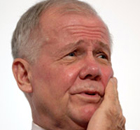World Business
Fed officials say low rate vow depends on outlook
(Agencies)
Updated: 2010-05-14 17:29
 |
Large Medium Small |
OTTAWA - The Federal Reserve's promise to hold interest rates ultra low for an extended period depends on economic conditions and could change if the recovery picks up, central bankers said on Thursday.
"Readers of the (Federal Open Market Committee) statement should pay very careful attention to its explicit conditionality," Minneapolis Federal Reserve President Narayana Kocherlakota said in speech in Altoona, Wisconsin.
"The statement says that the committee will raise interest rates if economic conditions change appropriately -- whether that's in three weeks, three months, or three years," said Kocherlakota, who is not a voter on the Fed's interest rate setting panel this year.
The Fed's No 2, Vice Chairman Donald Kohn, emphasized the same point in a speech at Carleton University, in Ottawa.
"Central banks cannot make unconditional interest rate commitments based only on a time dimension," he said. The Fed has made clear that the promise depends on the outlook for unemployment, inflation and inflation expectations, he said.
The Fed cut rates to near zero in December 2008 to buoy the US economy through the worst financial crisis and recession in decades. It renewed its pledged to hold rates exceptionally low for an extended period as recently as its last policy meeting in April.
The US economic recovery has been gaining strength and financial markets are watching keenly for any signs the Fed will soften the extended period vow as a precursor to raising interest rates.
Most of the financial firms that deal directly with the Fed do not expect interest rate increases until 2011.
Another Fed official, Dallas Fed Bank President Richard Fisher, said that despite signs the economic convalescence is picking up, it is not at the point where dropping the pledge is warranted.
"I don't think we are there yet," Fisher said in Odessa, Texas.
Kohn and Kocherlakota disagreed on two other topics of debate among US monetary policymakers: whether the Fed's vastly expanded balance sheet poses inflation risks, and whether the Fed needs to begin selling some of the more than $1.7 trillion in assets it bought to boost the economy after it brought rates down as far as they could go.
As the Fed's No 2 and a voter at every meeting of the Federal Open Market Committee, Kohn's views are more likely to reflect those of Chairman Ben Bernanke and point to the predominant view at the Fed. Bernanke did not discuss the outlook for monetary policy in remarks in Philadelphia on community development.
Kohn, who plans to step down in June, said the reserves the Fed pumped into to the banking system to combat the financial crisis should not be inflationary unless bank lending or inflation expectations jump.
The asset buying spree boosted the supply of bank reserves to $1.2 trillion from a level of around $15 billion before the crisis. The Fed's balance sheet has ballooned to about $2.3 trillion from around $900 billion before the turmoil that began in the summer of 2007.
Although some believe that extra bank reserves could translate into additional borrowing and spending by businesses and consumers, that does not seem to have happened, Kohn said.
But Kocherlakota said the Fed's massive balance sheet worries him and that the Fed should actively sell off some of the mortgage-backed securities it bought.
Kohn said the Fed has tools to stop inflation quickly from taking hold once the recovery gets going. Raising interest rates on reserves would encourage banks to leave them on deposit with the Fed rather than putting them into circulation, he said.
| ||||
Kohn acknowledged that the Fed must also carefully watch for evidence the enlarged Fed balance sheet is fueling any jump in anticipated inflation down the road.
"We need to be alert to the risk that households, businesses, and investors could begin to expect higher inflation based partly on an expanded central bank balance sheet," he said.
Central bankers put great emphasis on keeping inflation expectations in check because they believe that if businesses and consumers anticipate higher inflation, they will adjust their buying and borrowing behavior. Keeping inflation expectations in check is viewed as a critical step to keeping inflation at bay.















